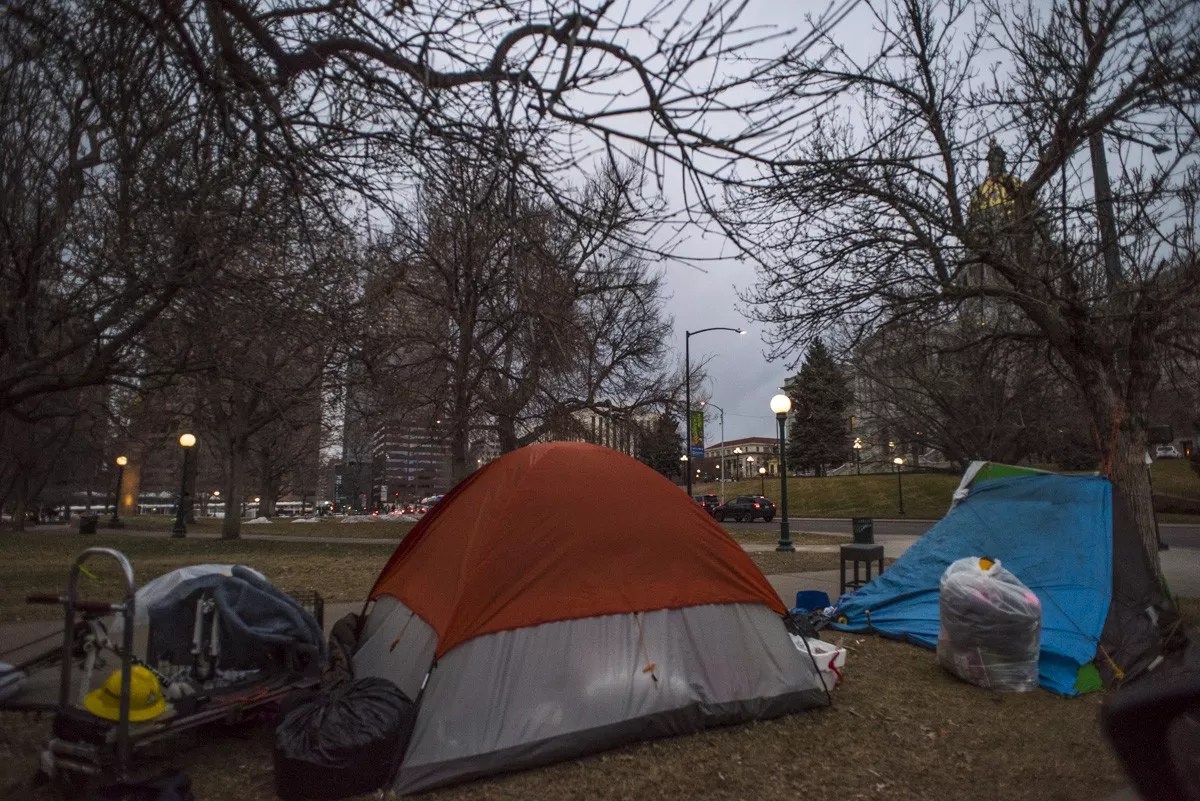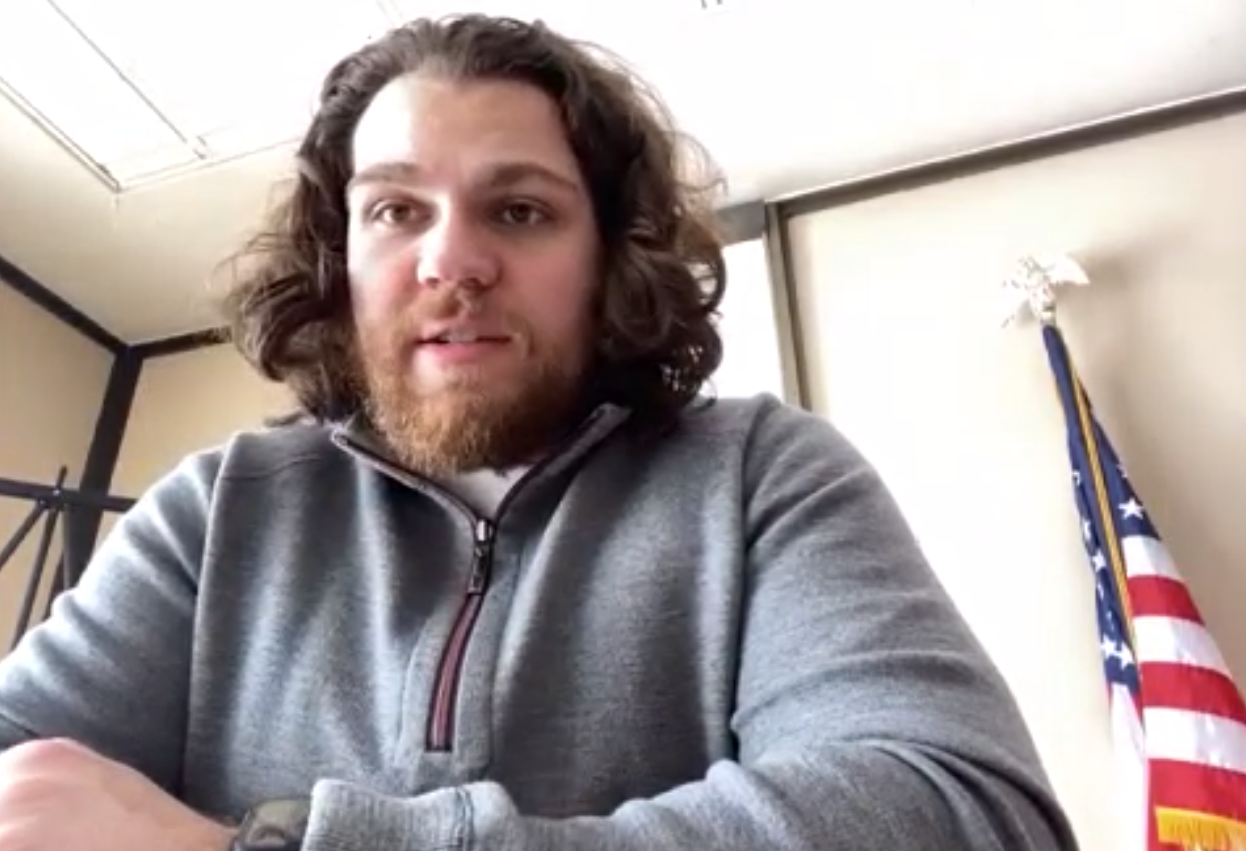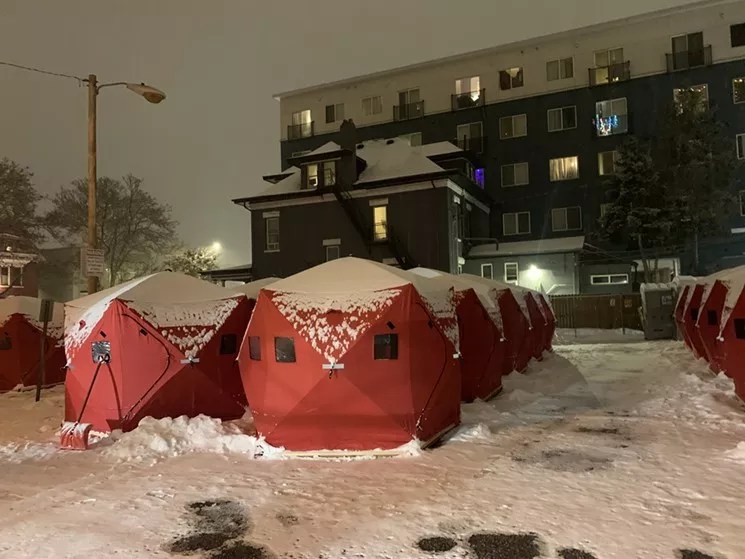
Evan Sem

Audio By Carbonatix
Garrett Flicker, the new chair of the Denver Republican Party, is pushing a proposal for the November ballot that would allow for up to four city-funded, sanctioned homeless encampments – and could also increase enforcement actions at unsanctioned encampments.
“We wanted to ensure that the encampments have basic services, such as sanitation, hygiene, running water and safety lighting. Due to these services costing more in your camps compared to your traditional pop-up encampments, and combine that with the ability to patrol these four encampments, we decided on four,” Flicker explained during an April 16 meeting with city staffers to answer questions about the proposed initiative.
The measure would revise the Denver urban camping ban passed in 2012 to include a provision allowing the four designated camping sites, while also bolstering enforcement requirements for dispersing unsanctioned encampments.
“Any person may file a complaint with the city to enforce this section,” the initiative language states. “The City must take enforcement action within 72 hours of the filing of a complaint.”
If authorities fail to act on that complaint in time, a person may sue the City of Denver, according to the proposal.
The proposed initiative does not specify the maximum size of a designated campsite nor the number of individual spaces within a site. During the April 16 meeting, Flicker explained that the initiative leaves “flexibilities in the ordinance to allow the city to decide on those specs.”
Flicker, who did not respond to Westword‘s requests for an interview, posted on Facebook about the meeting, noting that the initiative focuses on “remedying the homelessness epidemic.”
Flicker also spoke with Axios Denver, which noted that the Denver Republican Party chair is, at 25, “the youngest and first openly gay man to ever lead the group.” He told Axios Denver that he “wants the party to target the 2023 municipal elections, specifically in an effort to unseat two self-identified Democratic socialists: City Council member Candi CdeBaca and school board member Tay Anderson.”
And the encampment initiative isn’t the only one Flicker is pushing: He’s also working on a proposal to lower the Denver sales tax from 4.81 percent to 4.5 percent.

Garrett Flicker met with city officials on April 16 regarding the homeless encampment ballot initiative.
City of Denver
Denver voters have approved plenty of sales tax increases in recent years, including Measure 2B in November 2020, which increases funding for homelessness programs. And in May 2019, Denver voters overwhelmingly rejected Initiative 300, which sought to repeal laws that advocates viewed as criminalizing homelessness, including the urban camping ban, and create civil liability for Denver if the city violates certain rights of homeless people.
By current estimates, Denver has over 1,000 people living on the streets. The city conducts frequent sweeps of encampments, but is now bound by a federal court order that requires Denver to give seven days’ notice for most sweeps, and 48 hours’ notice even when emergent public-health conditions exist.
Service providers who’ve reviewed Flicker’s initiative say they have concerns about the proposal.
“While I clearly support the expansion of Safe Outdoor Spaces and similar strategies for unsheltered individuals, increased encampment enforcement through policing is the absolute wrong way to go about that,” says Cole Chandler, director of the Colorado Village Collaborative, which runs a safe-camping site for people experiencing homelessness. “This initiative would disproportionately impact Black, Indigenous and Latinx people, who are disproportionately represented in the unsheltered homeless population, and would be a huge step backwards for a city that has recently modified its encampment response strategies and a nation seeking to transform our public safety system.”
And Robin Kniech, an at-large member of Denver City Council, says that the city’s existing model for safe-camping sites is “far better than the camps this measure would advance.” There are currently two such sites, both set up by nonprofits. A third has been proposed for South Park Hill.
“Safe Outdoor Spaces provides not only designated space with sanitation, but also 24/7 staffing and support and services to help individuals resolve their homelessness. We don’t need a ballot measure to expand the model, we simply need a clear path for permitting sites after the pandemic ends (something within the power of the city today) and more political will and community acceptance to site additional locations,” Kniech adds.
Rather than the enforcement model proposed by the initiative, Kniech says, “I would strongly support providing mobile trash collection and rotating our mobile restrooms to mitigate the impacts of even unregulated camps, but the best use for land for long-term use would be for far more humane and proven interventions like Safe Outdoor Spaces or tiny home villages with services.”

Denver has two existing safe camping sites for people experiencing homelessness.
Conor McCormick-Cavanagh
The initiative’s language is “misleading,” says Cathy Alderman of the Colorado Coalition for the Homeless. “It talks about wanting to set up these safe outdoor spaces and wanting to do so with city funds, and if those four spaces don’t get set up – and they may not – then you still have more enforcement of the camping ban with fewer spaces for people to go. I don’t think it’s a very compelling ask, and I think it would be more harmful than helpful.”
In addition to Flicker, the ballot petition committee form lists four individuals at the same address in Park Hill. Two of them didn’t respond to messages from Westword; another hung up when a reporter identified himself. Reached by phone, the fourth person on the form, Jonah Smith, responded, “Unfortunately, I don’t talk to media sources.”
After the proposal was certified by the city, Flicker’s committee filed for permission to start gathering signatures; the Denver Clerk and Recorder’s Office will review the filing next week. In order for the proposal to make the November ballot, the committee will need to submit 9,184 valid signatures by early July.